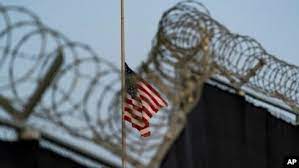Sarah Gannett
On June 26, to commemorate the International Day in Support of Victims of Torture, President Joe Biden issued a statement emphasising the United States government’s commitment to “eliminating torture” and “supporting its victims”.
While he named various countries and entities that have engaged in torture, he failed to name his own country. He did not acknowledge the use of torture against hundreds of people US forces had taken to black sites around the world, dozens of whom remain imprisoned at Guantanamo Bay. On the same day that Biden released his statement, UN Special Rapporteur Fionnuala Ni Aolain released a new report on the Guantanamo detainees. The document calls on the US government not only to apologise for its use of torture and provide redress for the victims but also to make sure they have proper access to healthcare and rehabilitation, which at the moment they do not. These men, including my client, Ammar al Baluchi, are still suffering from serious physical and mental health problems as a result of torture. There can be no doubt about the brutality of US torture techniques and the grave harm they cause.
In an unclassified declaration, al Baluchi described one incident: “I wasn’t just being suspended to the ceiling, I was naked, starved, dehydrated, cold, hooded, verbally threatened, in pain from the beating and water-drowning [sic], as my head was smashed against the wall for dozen[s] and dozen[s] of times.” This technique is called “walling” and was repeatedly used on him. In fact, an architect of the torture programme has admitted to using al Baluchi as a live prop on which to train new torturers.
Al Baluchi suffered a traumatic brain injury from walling, which has caused headaches, dizziness, extreme sensitivity to light and sound and has impaired his ability to think and perform everyday tasks. Doctors say these symptoms will worsen over time and require long-term, intensive therapy. The sleep deprivation he was subjected to has caused a serious sleep disorder that prevents al Baluchi from ever getting more than an hour or two of sustained sleep. He has harrowing nightmares and flashbacks that can be triggered by the slightest reminder of the torture, making it difficult for him to work with his lawyers. His muscles and joints still scream with the agony of being forced into unnatural positions.
Al Baluchi was also recently diagnosed with a tumour on his spine, which could affect his nervous system and motor function and require surgery. The government claims it provides prisoners with the same level of care it provides members of the military, but it refuses to convene a panel of experts to evaluate al Baluchi’s health and recommend a treatment plan as it would for any service member under its care. It does not even have a consistently functioning MRI machine at the Guantanamo Bay military base to monitor the tumour.
These serious medical issues cannot currently be addressed at Guantanamo, where – as the United Nations and International Committee of the Red Cross have recently documented – there is neither a proper hospital nor dedicated, independent medical staff. Medical records of detainees do not even acknowledge their torture. This is despite the fact that the US government does not deny torturing them. In 2014, the Senate Intelligence Committee found that the government committed horrific abuses against al Baluchi and other prisoners. The CIA even gave information about them to Hollywood producers who chillingly depicted al Baluchi’s torture in the film Zero Dark Thirty.
In 2021, military jurors deciding the fate of another torture survivor, Majid Khan, called the torture programme “an affront to … the concept of justice” and “a stain on the moral fiber of America”. But the courts have provided no remedy. Since 2008, lawyers have laboured in federal court in habeas corpus proceedings to apply constitutional protections – including safe, healthy conditions of confinement – to al Baluchi. We have not prevailed.
Our demands for justice have been put on hold while the military commissions courts grind on well into the second decade of pretrial litigation with no clear end in sight. Meanwhile, the health of my client and others continues to worsen. Over the past year, defence teams for al Baluchi and the four co-defendants in the 9/11 case raised torture treatment with the administration as part of plea negotiations. But those negotiations have now stalled with reports that the judge plans to resume hearings in the fall. As the military commissions drag on, the government must not wait to address the health effects of torture. Improvements in medical care at Guantanamo do not require court intervention. The administration could commit the necessary resources, likely at a fraction of the cost of the extensive (and expensive) litigation. As Aolain has written in her report, “The US Government’s failure to provide torture rehabilitation squarely contravenes its obligations under the Convention against Torture.”
If the Biden administration means what it says about supporting torture survivors, it must act now to improve medical conditions at Guantanamo, regardless of the status of the military commissions. To have any credibility, it must acknowledge the harm the US government has inflicted and commit to a comprehensive care and rehabilitation programme for Guantanamo detainees.







